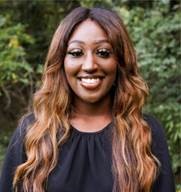- February 11, 2022
- Posted by: Jeanny Sharp
- Categories: 2022, All News & Blog Posts, Announcements & Statements, Press Releases
The importance of Black History Month and its impact on the community
Spotlight on two Friends of Yates’ KCK leaders and their work for Friends of Yates, Inc.
About 22% of Black women in the United States have experienced rape, according to the 2019 American Civil Liberties Union (ACLU). Forty percent of those Black women will experience intimate partner violence in their lifetime. Black women, girls, and non-binary people are seldom seen as victims. Instead, they are seen as deserving of harm or unable to be harmed. This perpetuates a long legacy of impunity for violence against Black women, girls, and non-binary people.
Friends of Yates (FOY), a Wyandotte County community-based organization, offers a full continuum of services, including domestic violence prevention, intervention programming and community response to crimes, among many other services. It (FOY) supports all victims/survivors.
 “We recognize the importance of having the conversations of today that center around domestic violence and Black victims/survivors,” said Rebbecca Johnson, Friends of Yates program director. “Friends of Yates was born out of racism — because Blacks could not go to the YWCA, so it created its own branch”
“We recognize the importance of having the conversations of today that center around domestic violence and Black victims/survivors,” said Rebbecca Johnson, Friends of Yates program director. “Friends of Yates was born out of racism — because Blacks could not go to the YWCA, so it created its own branch”
The Colored Women’s Branch of the YWCA was born in 1913. Later, in 1945, it was renamed Yates Branch YWCA. As a result of the Colored Women’s Branch, programs and jobs were created to provide equitable opportunities and services for African Americans. One of Friends of Yates, Inc.’s first programs was a home for women suffering from domestic violence, which was led by the Executive Director/CEO Emeritus LaDora Lattimore. Today, Friends of Yates is one of the strongest community-based organizations in Kansas City, Kansas, and provides a variety of programming that makes a positive difference in the community.
As an agency, anti-violence work in the context of Black History Month, is eradicating discrimination and violence against the black community and all marginalized communities.
“Our agency identifies the continued disparities in violence in the Black community, and African American survivors are overrepresented in the numbers of domestic and sexual violence victimization,” Johnson said. “It is important to bring awareness to how systemic racism impacts the ability for African American survivors to receive equitable treatment and service delivery. As a result, Friends of Yates has added culturally specific services to educate and bring awareness to the community of this issue, as well as enhance existing programming for survivors of color.”
Discussing the issues of sexual and domestic violence in the community along with barriers, community needs, and outreach can help to create a vibrant, well-informed community that is based on trust and togetherness.
 “Trust and togetherness can happen when we bring to light barriers like implicit and explicit biases that allow for the continuous mistreatment of a minority group,” said Tinaris Watson, Friends of Yates Culturally Responsive Advocate. “For example, an implicit or explicit bias formed against an African American woman can prevent her from receiving the help she needs to flee an abuser because she is perceived as the perpetrator due to stigmas such as “angry black woman” or prevent a young African American woman from receiving the help she needs because she was being perceived “promiscuous.”
“Trust and togetherness can happen when we bring to light barriers like implicit and explicit biases that allow for the continuous mistreatment of a minority group,” said Tinaris Watson, Friends of Yates Culturally Responsive Advocate. “For example, an implicit or explicit bias formed against an African American woman can prevent her from receiving the help she needs to flee an abuser because she is perceived as the perpetrator due to stigmas such as “angry black woman” or prevent a young African American woman from receiving the help she needs because she was being perceived “promiscuous.”
Identifying and removing barriers and focusing on the needs of the community can occur by way of outreach services to educate and inform. To give effective representation, it’s critical to address outreach services in the context of the community’s requirements. If the goal is to develop a cohesive community, it is essential to build trust with local social service providers, stakeholders, and law enforcement through communication and accountability.
“Sexual and domestic violence are rooted in oppression,” Watson said. “Because of this link, permitting oppression of one group of people means allowing sexual and domestic violence against all groups of people to continue. For example, we can’t choose to settle on the abuse and domination of a certain race of people while also attempting to eliminate sexual and domestic violence. Oppression, in all of its forms, must be abolished.”
Although anti-oppression work acknowledges this reality, because of the various ways oppression affects different communities — also known as intersectionality — there are underserved populations. Anti-oppression work acknowledges the broad problem areas on a macro level; however, Black women are in a “double-bind” with racism and sexism. Additionally, the Black LGBTQ community is experiencing violence because of the color of their skin and gender identity. The need for anti-violence work is evident to meet the micro-level disparities. As a result, anti-oppression has a positive impact on anti-violence work since it highlights the need of meeting the micro-needs; of those who are victims of violence.
Friends of Yates, Inc. can be reached at 913-321-1566 or via its 24-hour Hotline: 913-321-0951 www.friendsofyates.org
-END-
Founded in 1982, the purpose of the Kansas Coalition Against Sexual & Domestic Violence (KCSDV) is the prevention and elimination of sexual and domestic violence through a statewide network of programs providing support and safety for all victims of sexual and domestic violence and stalking with a primary focus on women and their children; direct services; public awareness and education; advocacy for victims; comprehensive prevention; and social change efforts. Learn more at https://www.kcsdv.org/.
Last Updated on Feb 11, 2022

